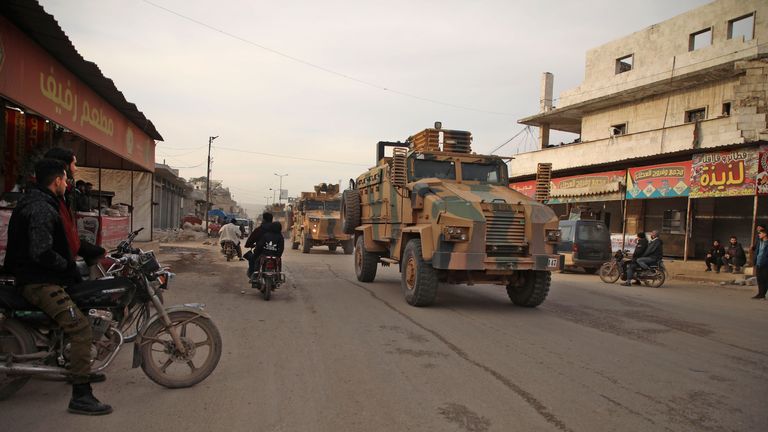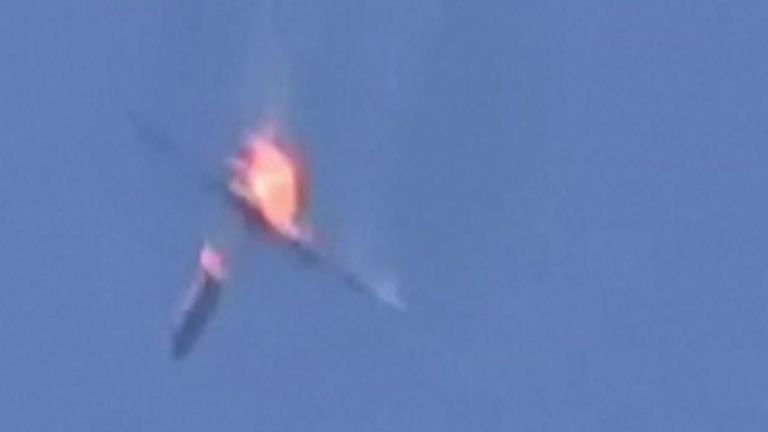Ceasefire in Syria after Russia and Turkey strike deal
Vladimir Putin expresses hope that the deal could end civilian suffering and help contain a humanitarian crisis.
Thursday 5 March 2020 22:38, UK
A ceasefire in Syria's Idlib has come into effect after Russia and Turkey struck a deal.
It comes after the county's leaders, Vladimir Putin and Recep Tayyip Erdogan, held more than six hours of talks in Moscow aimed at ending hostilities in the country's last rebel stronghold.
Mr Putin has expressed hope that the deal could end civilian suffering and help contain a humanitarian crisis, nine years after the start of Syria's civil war.
He said: "I express hope that these agreements will serve as a good basis for a cessation of military activity in the Idlib de-escalation zone [and] stop the suffering of the peaceful population and the growing humanitarian crisis."
The agreement involves a truce along the existing battle lines and envisages the establishment of a seven-mile-wide security corridor along the M4 road.
It will be jointly patrolled by Russian and Turkish troops and will begin on 15 March.
Mr Erdogan said: "We will work together to supply aid for the Syrians in need."
He added that Turkey retained the right "to respond to all [Syrian] regime attacks in the field."
Russia and Turkey support opposing sides in the conflict, with Moscow backing President Bashar al Assad and Ankara supporting some rebel groups.
There have been several ceasefire deals in Idlib in recent years which have collapsed.
Russian airstrikes have supported an offensive by Assad forces in Idlib that has caused what the UN says may be the worst humanitarian crisis of the conflict.
Moscow has, however, repeatedly played down any talk of a refugee crisis and accused Turkey of violating international law by sending troops to Idlib.
Ankara has funnelled troops and equipment into the area in recent weeks to repel the Syrian government's advance and prevent a wave of refugees crossing its southern border.
The fighting, which has raised fears of a direct confrontation between Russia and Turkey, has left 60 Turkish troops dead in the region since last month.
Mr Putin expressed his regret to Mr Erdogan about the killing of 34 Turkish troops in a recent airstrike, saying the Syrian military was not aware of their location.
Ahead of the talks, at least 16 civilians were killed when Russian airstrikes hit a group of displaced people near the town of Maarat Misrin in Idlib, according to civil defence workers who were helping to clear the rubble and search for survivors.
Russia denies targeting civilians.
Two witnesses reported seeing more Turkish forces deploying into Idlib, while Russia's RIA news agency reported that rebels had resumed shelling the strategic town of Sarageb in Idlib, where Russian military police are located.
Turkey's defence ministry said it had destroyed four tanks, five rocket launchers and a dozen military vehicles in artillery and airstrikes in the last 24 hours.
Ankara hosts some 3.6 million Syrian refugees and says it cannot take any more.
In a bid to get more funding and support from Europe over Idlib, Turkey said last week it would no longer abide by a 2016 deal in which it stopped migrants crossing into the EU in return for billions of euros in aid.
Syria ceasefires are usually short-lived - there's no reason why this one will buck that trend
Analysis by Diana Magnay, Moscow correspondent
Turkey's president said before this meeting that he was hoping for a ceasefire and on that front, at least, he does not go home empty-handed.
But ceasefires in Syria tend to be short-lived affairs and there's no reason this will be any different.
The M4 highway "security corridor" becomes the de facto new security line splitting Idlib's north from its south and more broadly though by no means exactly, anti-Assad forces backed by Turkey from regime troops backed by Russia.
It stretches from Latakia on the coast to the town of Saraqib, South East of Idlib city, recently retaken by Assad's forces.
The plan is for 6km on either side of that road to be a so-called "security corridor", patrolled by joint Turkish-Russian patrols and presumably therefore free of fighters.
That is a large strip of land right through the heart of Idlib province which militants of any stripe are unlikely to vacate without a fight.
How it will all work is yet to be decided upon, per the Protocol. As always, the devil is in the detail.
In Syria, for nine long years, the fighting has only stopped until it starts again.
It will take many more additional protocols, many more hours of diplomatic wrangling and sadly continued appalling civilian suffering before the guns quieten for good.
Ceasefires give all sides the ability to take stock and regroup. This will be no exception.







